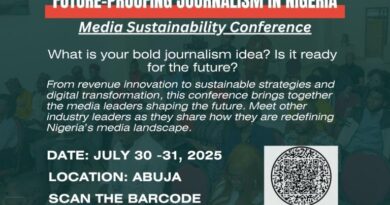CJID and changing the face of Nigerian Journalism By Prince Charles Dickson PhD
Journalism ……”If only…” These two words paired together create one of the saddest phrases in the English language.
In the end, more than anything else, we regret the small chances we didn’t take, the priceless opportunities we were too busy to nurture, and the good decisions we waited too long to make.
It made for a thrilling 48 hours as we meandered around the theme, Accountability Journalism: Nurturing Innovation for a Sustainable Future – with The Center for Journalism Innovation and Development CJID providing the platform towards enhancing accountability journalism for a sustainable future, at the very first West Africa Journalism Innovation Conference, a ground-breaking event.
With over 300 journalists, media professionals, tech enthusiasts, stakeholders, the academic community, policymakers and government institutions from more than a dozen countries.
It was a thriller hearing from Richard Gingras, the Vice President (News), Google as Keynote Speaker and the need to think about the future, and go pass the ifs of technology. Dapo Olorunyomi CEO, CJID/Publisher Premium Times outdid himself whether it was the goodwill or just chaperoning as moderator around conversations on Journalism and the challenges of Innovation.
Musikilu Mojeed, President, International Press Institute and Editor was spot on, like the school principal as he moderated the session on accountability journalism and challenges of sustainability and alongside, speakers like Frank Aigbogun, Publisher, BusinessDay. Toun Okewale CEO of Women Radio, Mohammed Ali (not the boxer) Deputy Director, News Operation, NTA.
We got heads up on innovating for press safety from Lawal Bakare of Safetity.
Professor Umaru Pate, Vice Chancellor, Federal University of Kashere, Nigeria, punched below and above the belt, and ended with those five Rs. I won’t share the secret here. But if you know prof, you would know he took no hostages.
There was a gallery of the creme de la creme of the practice, from gown to practice, it was reflective hearing Jude Ilo of the Centre for Civilians in Conflict (CIVIC). Jake Epelle was his effervescent self, as they navigated Media and Democracy, Eugenia Abu, the aunty herself was dealing as Lanre Arogundade Executive Director of the international Press Centre looked at regulations and spaces for press freedom advocacy.
The problem with mentioning names is that some names ultimately get lost in memory, but I must say the entire planning team did a “fantabulous” job.
For me, and I dare say the larger Nigerian society, we must begin to understand that accountability journalism plays a pivotal role in shaping societies by holding those in power accountable, safeguarding democratic values, and fostering sustainable development. In an era characterized by information overload and the rise of disinformation, the importance of promoting innovation within journalism cannot be overstated.
Whether as government, or as practitioners at the core of a thriving democracy lies a free press, which serves as a watchdog, scrutinizing the actions of governments, corporations, and other institutions. Accountability journalism empowers citizens with the information they need to make informed decisions and advocate for positive change. It delves into complex issues, exposing corruption, human rights abuses, and environmental threats, while also celebrating triumphs and achievements in society.
The landscape of journalism has undergone radical changes due to the digital revolution. Innovations in technology and communication have redefined how news is gathered, disseminated, and consumed. The West Africa Journalism Innovation Conference recognized the critical role innovation plays in empowering journalists to tackle new challenges effectively.
Many of us, especially of the ‘old school’ acknowledge the fact that there is a need to embrace components such as Digital Storytelling, Data Journalism, Collaboration and Crowd-Sourcing, Artificial Intelligence and Fact-Checking, and Audience Engagement amongst many others. The era of he said, while speaking to, he confirmed, she reiterated, and unconfirmed sources is gradually fading out, if not actually almost gone.
The West Africa Journalism Innovation Conference emphasized the need for sustainable journalism models. While I agree and many do too, that the five Ws and H will remain an anchor in news gathering, traditional revenue streams for media outlets are facing challenges, and embracing innovation can lead to the development of financially viable and sustainable news platforms.
So, the Nigerian media space must therefore Diversify Revenue Streams, Build Media Literacy, and Support Independent Journalism. I must state here that my heart is glad at what the future holds for Nigerian and West African journalism with the new kids on the bloc, fast thinking, innovative creative and more, listening to the likes of Mohammed Akinyemi of Zikoko Citizen, David Adeleke of Rest of the World, Joshua Olufemi, of Dataphyte or Anita Igbine of Code for Africa.
The networking was out of this world, meeting new friends, like Ahmed Sahid Nasralla of the Sierra Leone Association of Journalists, we could not get to talk, but my brother and friend, Dayo of ICIR, be assured that we have a lot of catching up to do.
I am using this medium to thank all of us that were part of the “Paradise Experience” and to one of the most wonderful hosts I have met in recent times, Iretomiwa, and Debo, both of CJID. The CJID Secretariat did a wonderful job. The anchors and moderators like Tobi Oluwatola, ED CJID, Akintunde Babatunde, Busola Ajibola, Mboho Eno, Caroline Anipah all of CJID, Tolulope of News Central, Maupe Ogun-Yusuff, Channels TV, and Dr. Williette James of Fourah Bay College were all superb.
A BIG THANK YOU to MacArthur Foundation, funders, media partners and all, let me say we may have ended the first West Africa Journalism Innovation Conference which has served as a catalyst for the region’s media ecosystem to foster accountability journalism through innovation. Embracing technology, data, and audience engagement, while ensuring sustainability and media literacy, journalists in West Africa must be well-equipped to tackle pressing challenges and shape a brighter, more transparent, and sustainable future for their societies. As the conference concluded, it was evident that innovation is not just a means to an end; it is the lifeline that journalism needs to thrive in the digital age, till we see next year—May Nigeria Win!




